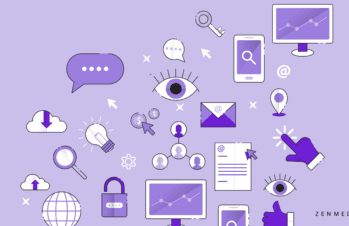AI has disrupted nearly every aspect of business, and marketing is no stranger to it.
According to a report from Blueshift that analyzed 3.8 billion marketing interactions, AI-powered marketing campaigns achieve 3x the revenue, relative to their use in the marketing mix, and a 3.1x – 7.2x lift in customer engagement, while continuously improving campaign performance.
And a study by the International Data Corporation revealed that, by 2021, 30 percent of B2B enterprises worldwide will use AI to suggest innovative customer experience actions that deliver value from a persona, segment, or individual customer perspective.
So there is no doubt that AI technology has benefits and holds tremendous promise.
So why, then, are so few B2B marketers taking advantage of it?
Here, we’ll take a look at:
- How much B2B marketers actually know about AI
- The barriers preventing AI from being adopted on a wider scale
- Some of the applications where AI is utilized, and if they’re really worth implementing
- Why AI needs humans as much as humans need AI

Still “Getting to Know You”
The Very Early Stages of Learning About AI
With so many ideas, concepts, and perspectives coming from vendors, analysts, and thought leaders, AI is one of the most hyped methods in marketing technology today.
However, this hype might have created a cloud of confusion for many B2B marketers, as the seemingly unlimited possibilities and concepts that stem from AI can distract from how brands could get the best value out of it.
Being aware of the promise that AI holds is one thing.
But being clear of what this technology means, and the potential impact it could have on your marketing efforts and business objectives, is a whole other ball game.
According to a report by EverString and Heinz Marketing, The State of Artificial Intelligence in B2B Marketing, a significant percentage of B2B marketers are in the early stages of learning about AI in marketing technology and are not yet confident in their current knowledge of it.
Some marketers have broad expectations of AI, while others are still unsure if they fully understand what it is. The report revealed that 49 percent of all respondents (comprising more than 300 B2B marketing and sales professionals within a variety of organizations and industries) are not using AI, or do not currently have a role for it.
Beyond this, 32 percent of marketers are not confident in their knowledge of AI, and 54 percent are only somewhat confident in their AI understanding. This shows that B2B marketers are likely aware of general AI concepts but still have more to learn in order to build their understanding of how to effectively apply AI and drive value from its use.
And in addition to these low to moderate levels of confidence in AI understanding, 37 percent of B2B marketers are not clear on the difference between types of AI, like predictive modeling and machine learning.
This confusion might be the result of vendors and thought leaders appearing to use these terms interchangeably.
Understanding the Expectations for AI
AI is ideally positioned to supercharge marketing technology in a number of highly valued key areas for marketers, like identifying ideal market and customer opportunities, predictive modeling, improving data quality, and bringing greater overall efficiencies to marketing operations—all of which have measurable impact on an organization’s revenue performance.
But B2B marketers are still in the early stages of understanding the potential value impact AI can play when it comes to driving business revenue.
According to the EverString and Heinz Marketing report, 71 percent of marketers are most interested in using AI to drive powerful customer engagement with personalization. This aim doesn’t come as too much of a surprise as personalization plays a huge role in winning B2B marketing initiatives.
And with more training and knowledge in AI, this area of interest has the potential to become a major opportunity for marketers.

The Challenges Facing AI Adoption in B2B Marketing
Data
Even if marketers have passed the “getting to know you” phase with AI and are at the point of fully understanding the capabilities and value concepts of this technology, there are still issues surrounding implementation. And, by far, the biggest problem on the list is data.
Data is the Achilles heel of AI.
Regardless of how good the algorithms are, AI will not produce usable insights and information to drive demand if you cripple it with static data from your CRM, or that was purchased from conventional data vendors.
AI is heavily reliant on having access to high quality and high quantity data, and managing that data properly.
However, data for B2B marketing is relatively rare and its value can be difficult to extract. Considering this lack of valuable data, and the fact that the data collected is often irrelevant and poorly managed, B2B marketers often miss out on actionable insights, which in turn, can lead to ineffective marketing strategies.
Thus, addressing the lack of data orchestration is a priority for AI use in B2B marketing.
A solution for B2B marketers could be borrowing the insight of AI even when it doesn’t have sufficient data itself. Google Analytics that unveils people’s search intent or SEO research to find keyword themes can be used to formulate useful hypotheses which can then be applied to a specific marketing scenario.
No Significant Evidence that AI Powers B2B Sales
Many organizations are continually investing in AI in order to maintain competitiveness in the market. However, using AI to power B2B sales is still in its infancy and has not yet achieved a significant impact.
Recent studies have sought to examine the potential impact of AI in B2B sales management. But to date, there is no research that explores how AI can optimize customer engagement or how AI-fostered new product development can be achieved with governance of AI-related capabilities.
For B2B marketers, these issues are worthy of deeper investigation.
Concerns Surrounding Privacy, Transparency, and Bias
Harvesting and processing customer data using AI algorithms gives rise to serious issues surrounding privacy concerns and lack of transparency.
Irrelevant or invasive advertising circulated by automatic email and social media marketing with AI, for instance, often exasperates B2B customers. Such ineffective marketing initiatives created by AI could result in a brand losing trust with its audience.
Additionally, AI that uses historical data to forecast future events can automatically build in existing biases that might perpetuate inequality. For example, in 2014, Amazon’s recruiting tool began discriminating against women because they didn’t have the attributes of the data set it was trained on. The reason for this was because, historically, Amazon had hired more male software engineers.
These reasons make it imperative that B2B marketers think long and hard about how to negate and deal with potential ethical issues when designing AI solutions for B2B marketing.

Is AI for B2B Marketing Really Worth It?
So, with AI being difficult to understand and having a number of issues surrounding its implementation and use, is it really worth it for B2B marketers?
Well, we definitely believe it’s worth considering. And here’s why.
Predictive Marketing Analytics
It can be difficult to forecast results in the beginning stages of creating and implementing B2B marketing campaigns.
In these situations, AI can be used to analyze past campaigns, and based on those results, predict the likely outcome of a current project.
This can help to forecast the potential performance of a campaign, as well as estimated revenue and conversion rates.
Campaign Analysis
Because there’s such a wide range of B2B marketing channels today, the data generated by these channels is a lot more complicated to analyze. AI enables B2B marketers to conduct a faster, more precise review of data so that decision-makers can swiftly see what’s working, what needs to be adjusted, and where improvements should be made.
Better Lead Generation
Account-based marketing (ABM) tools, such as Demandbase, enable B2B marketers to efficiently target potential prospects that align well with their existing clients.
By enabling users to build audiences using their existing CRM, account, and customer data, an AI-powered ABM solution shifts the focus of marketing teams from generating large volumes of leads to identifying and reaching out to fewer, much more qualified prospects.
Enhanced Audience Engagement
Based on its analysis of prior content, AI can recommend an enhanced SEO strategy that heightens interest and interaction. This helps B2B marketers communicate with their target audiences in a highly personalized, much more engaging manner.
Interaction Data
By analyzing the sum of all the digital footprints that customers leave behind during their purchase journeys (known as interaction data), AI tools help to predict the context of customer interactions, and also helps to improve it.
Organizations are learning to manage customer data from disparate sources in a better way by integrating them with existing data in order to extract valuable insights with speed and precision.
More Successful Email Marketing
With the inboxes of B2B customers constantly inundated with messages from colleagues, clients, and others, it can be difficult for marketers to break through all the clutter. AI offers a number of powerful capabilities that can help marketers achieve better results from their B2B email marketing campaigns. They include:
- Learning your brand voice through data you use to teach it, then drafting subject lines that increase opens and earn higher revenue
- Offering personalized email content recommendations on an individual level
- Using historical data to break your marketing campaign into hundreds of sub-campaigns internally, then structuring and delivering them to maximize inbox delivery
- Optimizing email send times at the individual level to ensure each recipient is more likely to see your email
- Automatically curating your content to create a personalized newsletter for each recipient

Smart Machines Working with Intelligent Humans
The possibilities that AI brings to B2B marketing are seemingly endless. Not only does this technology allow marketers to work faster, it helps to ensure that we work smarter and that our efforts have a greater chance for success.
However, managing AI is not merely a simple technical issue. Rather, it requires seamless synergy between AI technologies and the capabilities and knowledge of human beings, enabling them to work cooperatively.
At its foundation, true artificial intelligence is teaching a computer to mimic human behavior. But, although computers may be excellent at replicating intelligent behavior, they still come up short when asked to think intelligently.
The relationships that are so important in B2B businesses require human and emotional connections. AI can crunch massive data pools, determine the best times to send an email, and make smart media purchases through real-time bidding. But they can’t understand how or why emotional connections happen. And those emotional connections have always, and still remain, a vital part of business-to-business relations.
When considering all the potential and promise that AI holds for enhancing B2B marketing, it’s hard to deny its use now and definitely for the future.
However, putting AI technologies in place isn’t as simple as downloading a program, inputting some data, and leaving it to do its work.
Effectively implementing AI into your B2B marketing strategies and efforts requires solid knowledge of the technology and an understanding of what you should expect from it.
Other critical considerations include that it’s going to take some effort to gather the high quality data that AI needs to successfully work, there’s a chance that you might not experience a massive jump in B2B sales, and you need to be extremely careful when it comes to data privacy, transparency, and bias.
But when implemented well, AI can add some major superpowers to your B2B marketing campaigns and initiatives.
The bottom line? Marketers must work with, not solely rely on, AI technology to garner results.
After all, regardless of the technology, successful marketing always needs a personal, human touch.




